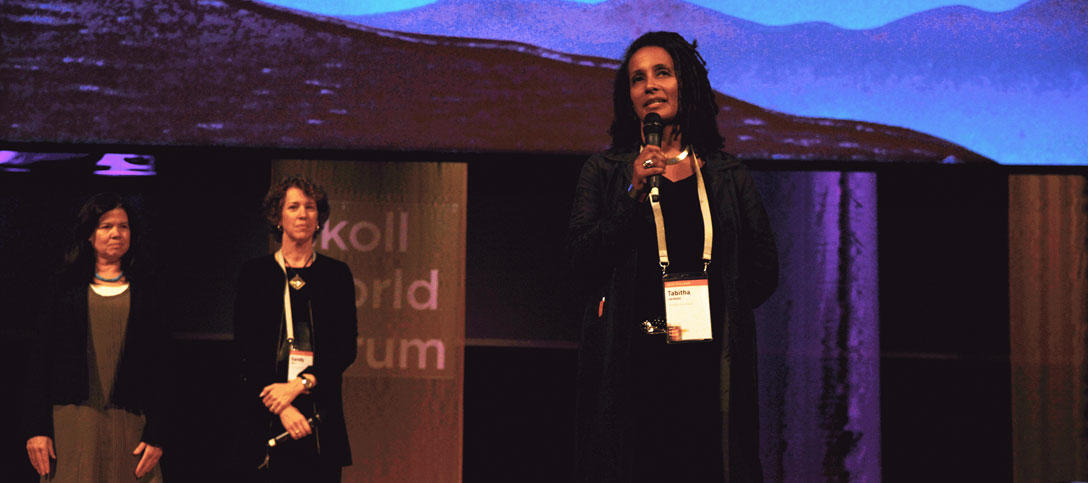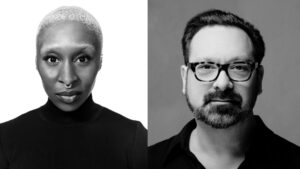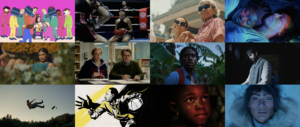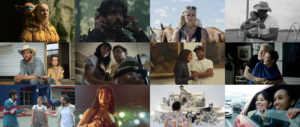Sundance Institute Documentary Film Program director Tabitha Jackson speaks at the Skoll World Forum.
Wendy Levy
The Skoll World Forum happens in Oxford every April; it is a gathering of over 1,000 social entrepreneurs who are leading organizations that are changing the world, at tremendous scale. From global health to child trafficking, literacy to poverty, climate change to global corruption — the commitment, vision and passion of this community is breathtaking.
Every year I meet someone who just picked up her Nobel Prize, or just had lunch with the Dalai Lama, or just helped lead the movement that created 1,000 new health centers in India and is now headed to Africa to do the very same thing. Tireless. Driven. Committed. And they love to drink, dance, and talk for hours into the night. The Sundance Institute team felt at home right away.
The Stories of Change team at the 2015 Skoll World Forum included Sundance Institute staff Tabitha Jackson, Richard Ray Perez, Hanul Bahm, Anne Lai and Kamal Sinclair—along with filmmakers Dawn Porter, Anjali Nayar, Nicole Newnham, and Corie Shepherd Stern, with help from Paco de Onis and Pamela Yates. And me, senior consultant to the Documentary Film Program. We showed films, led workshops, held panels, convened networking sessions, held one-on-one meetings, hosted dinners, and spread story love over as many change-makers as possible.
In the photo below, you see Richard Ray Perez (left) moderating a panel at the New Theater after a screening of Disruption, a Pamela Yates (middle) and Paco de Onis (right) film about a band of “activist economists” that is shifting the paradigm in Latin America and around the world. The film asks, “Can cash transfers to poor women along with new technology bring people out of poverty? Can 20 million women upend a continent?” It was a perfect film for the Skoll audience—the subject, Yves Moury of Fundacion Capital, is a Skoll Foundation awardee. This screening was one of many provocative story-driven conversations that the Sundance team helped ignite in Oxford that week.

The Story of Change: Revolution Begins in the Imagination
No one moderates a panel discussion like BRITDOC CEO Jess Search (with creative producing support from Beadie Finzie). They get panelists to divulge exquisitely personal information, share poems and quotes at exactly the right moment, and chart the course of a discussion so the whole room feels involved. At this panel, Carne Ross of Independent Diplomat and Charmian Gooch of Global Witness joined Sundance filmmakers Pamela Yates and Dawn Porter in a far-reaching conversation about speaking truth to power, the responsibility of leaders in a leaderless revolution, and the role of artists in liberation. It was tough for @twendywendy to keep up with the tweets; insight was everywhere. For more info, check out the Skoll page.
Optimist or pessimist? Carne Ross is 40% profound rage, Pam Yates congenital optimist – for all, change is possible #SkollWF @sundancelabs
— Wendy Levy (@twendywendy) April 16, 2015
culture has the power to shape politics and ordinary peope have the power to change the world #SkollWF @sundancelabs pic.twitter.com/D1kjqibq28
— Wendy Levy (@twendywendy) April 16, 2015
“Respect strength, never power..” (A Roy) Film takes what you think you know and turns it on its head @dawnporterm #skollWF @sundancelabs
— Wendy Levy (@twendywendy) April 16, 2015
Changing the Stories, Changing the World
In addition to screenings and panels, the Sundance posse led two workshops that brought storytelling into the center of the Forum. Our first 6-hour Story Workshop featured one-on-one round robin meetings with Skoll social entrepreneurs who are leading global organizations achieving change at scale — in areas like public health, environmental sustainability, human rights, poverty, etc.
We created a responsive format where Sundance storytellers helped tease out the participating organization’s most compelling stories — sharing strategies for finding and telling diverse narratives, collaborating with communities, and embedding a storytelling practice in their work. The room buzzed for the full 6 hours. We met resistance. We discovered new voices. We fell in love a little bit.
A little later in our week in Oxford, we also led a Networking Session that brought leaders together to deepen their connections through personal storytelling. Tabitha shared examples of some powerful first-person narratives and the 100 people in the room broke into story circles and everyone shared a 3-minute story about why they do the work they do.
There was high drama, passion and tears, fears of failure, tales of soul-searching, escape from conflict zones – the emotional gamut. At the end of the session, the most memorable stories from each group were shared on stage via their first lines only – a closing poem representing the honesty and authenticity of the connections made and friendships forged. We turned that room from a staid lecture hall into an international gabfest. Serious kumbaya moments in the most unexpected places.
But our goal was even deeper than kumbaya. If we could use what skills we brought to the Forum to help the Skoll community tap their creative imagination to find the solutions they seek for the good of our collective humanity, then we are on the right, and righteous, track. Beyond articles, blogs, movies, books, photographs, beats, rhymes and all the rest, we brought our belief in the power of story as a force for change and gave it as a gift and an invitation to all who came to listen.




